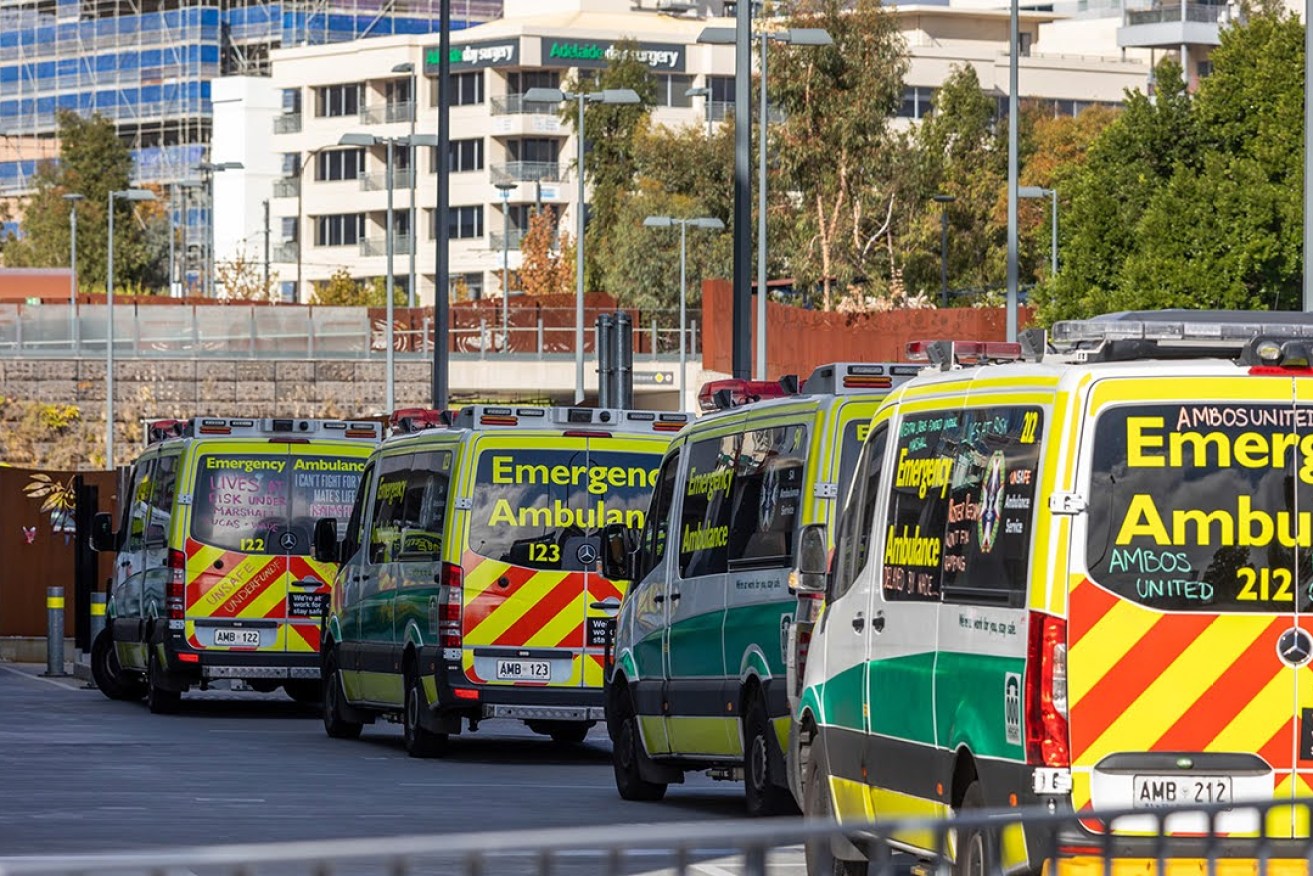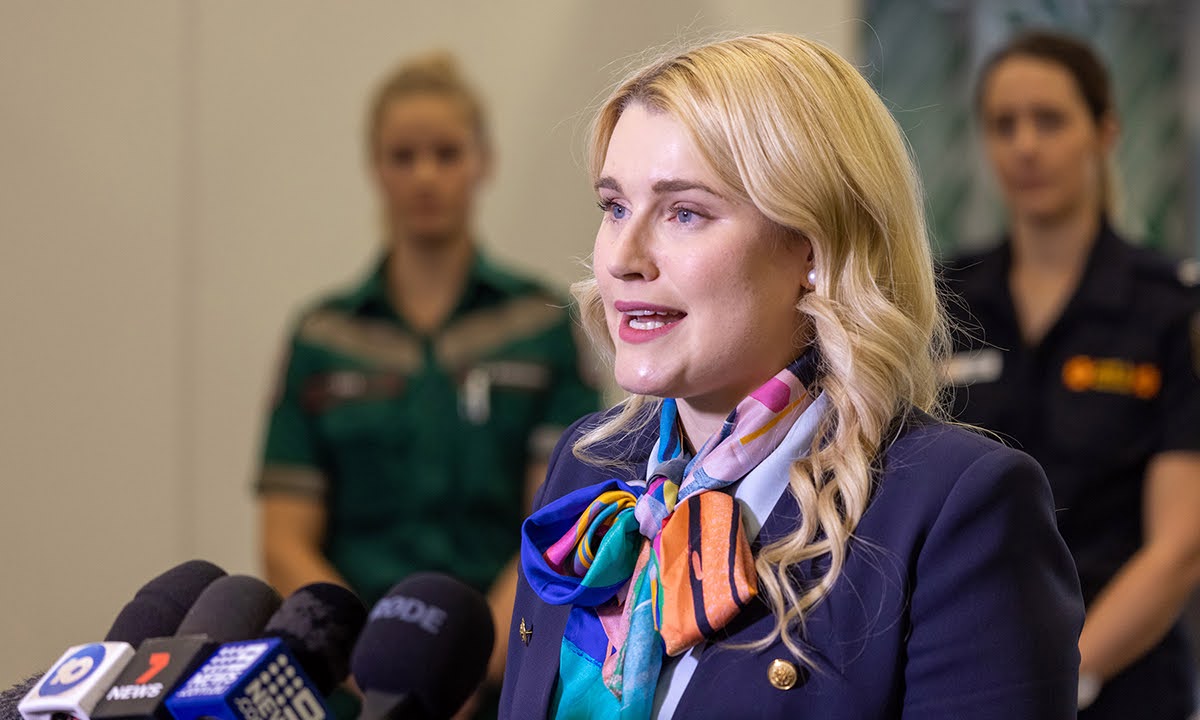160 days worth of ramping outside SA hospitals in June
Patients and ambulances spent 3838 hours – the equivalent of 160 days – ramped outside South Australia’s overwhelmed hospitals last month, Health Minister Chris Picton has revealed.

Photo: Tony Lewis/InDaily
The ramping figure for June is an increase of 426 hours – over 17 days – compared to May, when ambulances were ramped for 3412 hours.
Picton released the latest figures this morning, telling reporters that the statistics were “clearly unacceptable” and showed that the state’s hospital system wasn’t coping with current demand.
He said hospitals had recently experienced “really difficult weeks”, with over 100 people stuck waiting for beds in emergency departments each day.
“There’s a huge number of people who are stuck waiting for a bed inside our emergency departments every day who need access to beds in hospitals,” he said.
“That access block inside the emergency departments means that people can’t get off the ambulance ramp and ultimately people are waiting too long when they need an ambulance in the community.”
Labor was elected in March promising to “fix the ramping crisis” by returning ramping levels to where they were four years ago. The SA Ambulance Employees’ Association spent $400,000 on a high-profile state election campaign highlighting the issue under the former Marshall Government.
But since Labor won government, ambulance ramping has worsened: last month’s response times were the worst on record for 2021-22, with only 61 per cent of urgent life-threatening callouts seen on time.
Asked if the statistics showed that Labor’s plan to fix the ramping crisis was failing, Picton responded: “What this suggests is that we don’t have enough capacity in the system”.
“We’ve committed over 550 beds in addition to what we have at the moment – these will take years to build unfortunately,” he said.
“We have opened up every single bed that we have in the health system at the moment.”
Picton said the government had planned to open additional hospital beds at the old Wakefield Hospital, but the site was decommissioned.
“In the recent week, (the government) purchased additional beds in the private hospital system to provide additional capacity,” he said.
“We need that additional capacity to enable the flow.”
The Australian Medical Association last month told InDaily that the current crisis in SA’s hospital system was exacerbated by the fact the National Disability Insurance Scheme (NDIS) was leaving people with disabilities “languishing” in crowded hospitals.
“Because of the broken system, clients are getting stuck in hospital when they really should be in the community,” the association’s vice-president Chris Moy told InDaily at the time.
Picton today said that there were currently 250 NDIS patients in hospitals, with over 120 ready to be discharged.
“Unfortunately, we just don’t have the step-up in the NDIS capacity to be able to get those people out of hospital,” he said.
“They’re taking up hospital beds that are needed by other people. That’s a huge issue.
“We are working on how we can address (this) in terms of getting those people more appropriate care outside of hospital and also making sure that the next person can use those beds as well.”
SA records 3809 new COVID cases

Deputy chief public health officer Dr Emily Kirkpatrick. Photo: Tony Lewis/InDaily
It comes as SA Health today reported 3809 new COVID-19 cases – a slight increase from the 3762 infections reported yesterday.
However, the number of people with COVID in hospital has dropped from 254 to 249, with nine of those in intensive care.
Modelling predicts South Australia will record between 5000 to 6000 daily COVID cases within three weeks’ time, with the number of people admitted to hospital because of COVID – as opposed to with COVID – also set to rise from an estimated 75 patients currently to about 150 patients by the end of July.
Deputy chief public health officer Dr Emily Kirkpatrick said it was important for the public to recognise that the recent spike in COVID cases is expected.
“We are seeing these changes happening nationally as well,” she said.
“We would encourage anyone who is particularly in indoors or crowded spaces to be donning their masks.”
The government today announced that four respiratory clinics funded by the Commonwealth Government in Pooraka, Parkside, Athelstone and Old Reynella would expand their services to test for multiple respiratory illnesses.
Until now, the clinics only tested and vaccinated against COVID-19.
“People who have respiratory illnesses understandably are being turned away from GP practices, and they’re finding it more difficult to get access to that early primary health care for them or their kids,” Picton said.
“That’s leading to significant delays in people being able to get access to that care, which ultimately means that people are getting sicker and ultimately having to present in our emergency departments.
“We’re now partnering with these four respiratory clinics to provide additional services to the community to make sure not only are we just screening people for COVID or treating people with COVID specifically, but will be treating people and screening people for a whole range of different respiratory illnesses.”
The additional services will start at the Pooraka clinic today, with the three other clinics to come on board in the coming weeks.




